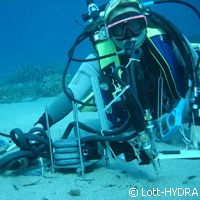EU project spotlights CO2 storage in marine ecosystems
Making the geological storage of carbon dioxide (CO2) environmentally safe is high on the EU agenda. Officials, researchers and industrialists are targeting the implementation of carbon dioxide capture and storage (CCS) in the region. The question, however, is what are the short and long-term impacts of CO2 storage on marine ecosystems? The ECO2 ('Sub-seabed CO2 storage: impact on marine ecosystems') project, backed with EUR 10.5 million under the OCEAN budget line of the EU's Seventh Framework Programme (FP7), is set to provide the answers. The European Commission believes CCS can play a vital role in helping reduce greenhouse gas emissions as well as in mitigating climate change. A number of EU Member States plus Norway have pledged to store CO2 below the seabed, but more extensive work on assessing the safety of these sub-seabed storage sites is required. This is where ECO2 comes in. Led by the Leibniz Institute for Marine Sciences (IFM-GEOMAR) at the University of Kiel in Germany, ECO2 brings together the expertise of 27 researchers and industry actors from Belgium, France, Germany, Italy, the Netherlands, Norway, Poland, Sweden and the United Kingdom. ECO2 will pay particular attention to probing existing sub-seabed storage sites in the Norwegian North Sea (Sleipner) and the Barents Sea (Snøhvit). They will also evaluate the B3 oil and gas field in the Polish Baltic Sea, as it is being considered for a future storage site. The natural seeps at the seafloor will also be assessed to help the team evaluate the impact of potential CO2 leakage on the marine ecosystem as well as the safety of storage sites. Under the plan, they will also examine the potential economic and legal consequences of leakage from sub-seabed storage sites. Experts believe that CO2 emissions from industrial and power plants can be cut when CO2 and its sub-surface storage is captured. The ECO2 consortium, pooling the resources of geologists, biologists, chemists, economists, social scientists and lawyers, is going to provide a comprehensive risk assessment and guidelines for monitoring sub-seabed CO2 storage. The partners, once the project ends in 2015, will deliver a best environmental practice guide for preparation and management of storage sites. Ultimately, the team will determine whether or not gas is being released at the three sites, how it could be moved through the various strata of the seafloor and the water column, and which reactions are involved. The partners will collect comparative data at natural CO2 seeps off the salt dome Juist (Germany), the Jan Mayen volcanic island (Norway), the Panarea island (Italy) and the back arc basin Okinawa Trough (Japan). They will also test advanced instrumentation for monitoring of storage sites in the field during more than 12 research cruises. The ECO2 team will assess the possibility of leakage and the effect on marine organisms and ecosystems in both the field and in the laboratory. Numerical modelling tests will be conducted in the latter. According to the partners, the first expeditions will take place in the spring and summer seasons of this year. Results will be disseminated to stakeholders and the general public.For more information, please visit:ECO2:http://www.eco2-project.eu/Leibniz Institute for Marine Sciences (IFM-GEOMAR):http://www.ifm-geomar.de/index.php?id=1&L=1
Countries
Belgium, Germany, France, Italy, Netherlands, Norway, Poland, Sweden, United Kingdom



